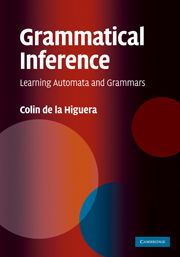Book contents
- Frontmatter
- Contents
- Preface
- Acknowledgements
- 1 Introduction
- 2 The data and some applications
- Part I The Tools
- Part II What Does Learning a Language Mean?
- Part III Learning Algorithms and Techniques
- 11 Text learners
- 12 Informed learners
- 13 Learning with queries
- 14 Artificial intelligence techniques
- 15 Learning context-free grammars
- 16 Learning probabilistic finite automata
- 17 Estimating the probabilities
- 18 Learning transducers
- 19 A very small conclusion
- References
- Index
13 - Learning with queries
from Part III - Learning Algorithms and Techniques
Published online by Cambridge University Press: 05 July 2014
- Frontmatter
- Contents
- Preface
- Acknowledgements
- 1 Introduction
- 2 The data and some applications
- Part I The Tools
- Part II What Does Learning a Language Mean?
- Part III Learning Algorithms and Techniques
- 11 Text learners
- 12 Informed learners
- 13 Learning with queries
- 14 Artificial intelligence techniques
- 15 Learning context-free grammars
- 16 Learning probabilistic finite automata
- 17 Estimating the probabilities
- 18 Learning transducers
- 19 A very small conclusion
- References
- Index
Summary
Among the more interesting remaining theoretical questions are: inference in the presence of noise, general strategies for interactive presentation and the inference of systems with semantics.
Jerome Feldman (Feldman, 1972)La simplicité n'a pas besoin d'être simple, mais du complexe resserré et synthétisé.
Alfred JarryWe describe algorithm LSTAR, introduced by Dana Angluin, which has inspired several variants and adaptations to other classes of languages.
The minimally adequate teacher
A minimally adequate teacher (MAT) is an Oracle that can give answers to membership queries and strong equivalence queries. We analysed in Section 9.2 the case where you want to learn with less.
The main algorithm that works in this setting is called LSTAR. The general idea of LSTAR is:
• find a consistent observation table (representing a DFA),
• submit it as an equivalence query,
• use the counter-example to update the table,
• submit membership queries to make the table closed and complete,
• iterate until the Oracle, upon an equivalence query, tells us that the correct language has been reached.
The observation table we use is analogous to that described in Section 12.3, so we will use the same formalism here.
An observation table
An observation table is a specific tabular representation of an automaton. An example is given in Table 13.1(a).
- Type
- Chapter
- Information
- Grammatical InferenceLearning Automata and Grammars, pp. 269 - 280Publisher: Cambridge University PressPrint publication year: 2010



